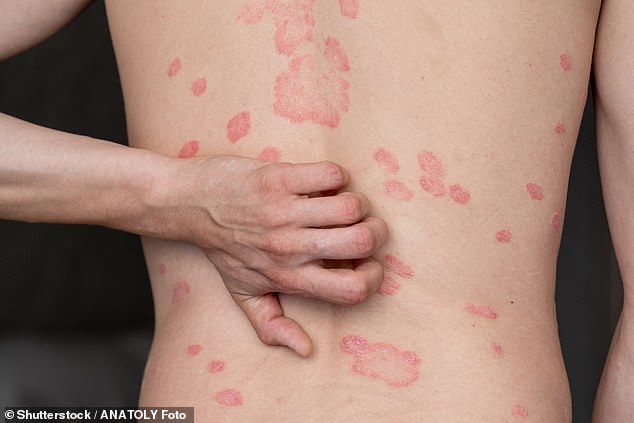Scientists have discovered that a debilitating skin condition affecting more than a million Britons could be due to “too much” of the nutrient iron.
Psoriasis leaves sufferers covered in disfiguring red, scaly patches and affects one in 50 people in the UK.
Celebrities such as Kim Kardashian, 43, and model Cara Delevingne, 32, have spoken about their fight against this incurable disease.
Although doctors aren’t sure what causes flare-ups, it is thought that people with psoriasis have too many skin cells, which build up and create itchy rashes all over the body.
But now research from the University of Bath suggests the condition may be caused by a failure in the hormone responsible for regulating iron levels.
Research from the University of Bath suggests that psoriasis may be caused by a failure in the hormone responsible for regulating iron levels.

Iron is essential for transporting oxygen through the body’s circulatory system, as well as maintaining healthy skin.

Psoriasis leaves sufferers covered in disfiguring red, scaly patches and affects one in 50 people in the UK.
Iron is essential for transporting oxygen through the body’s circulatory system and for maintaining healthy skin.
However, when too much is produced in the skin, the nutrient can be harmful: it amplifies the effects of ultraviolet sunlight and causes diseases, such as psoriasis, where cells multiply more than normal.
The study, published in Nature Communications, states that the key to understanding overproduction lies in the hormone hepcidin, which controls the amount of iron that is absorbed from food and released in the body.
In healthy people, the hormone is produced exclusively in the liver, but in patients with psoriasis it is also produced in the skin.
Scientists used mice to show that mammals develop psoriasis when exposed to high levels of hepcidin.
Dr Charareh Pourzand, from the University of Bath, said: “Psoriasis is a life-changing disease. A new treatment targeting the imbalance of the iron hormone in the skin offers hope.
“This innovative approach could significantly improve quality of life, restoring confidence and well-being.”


